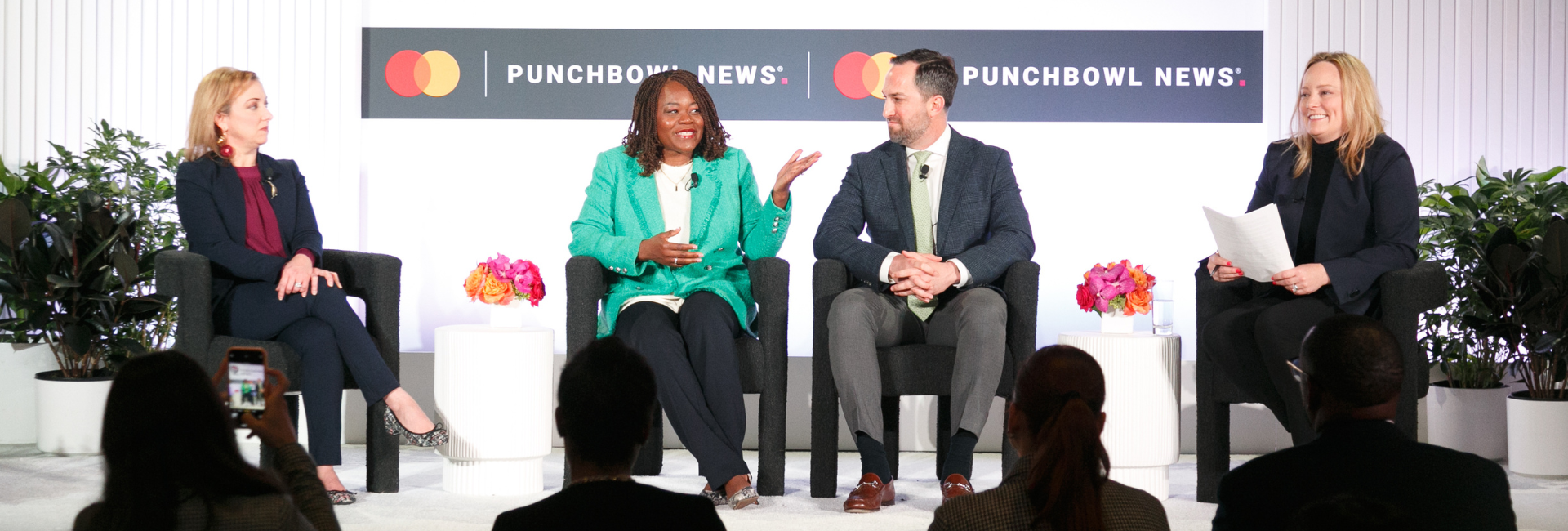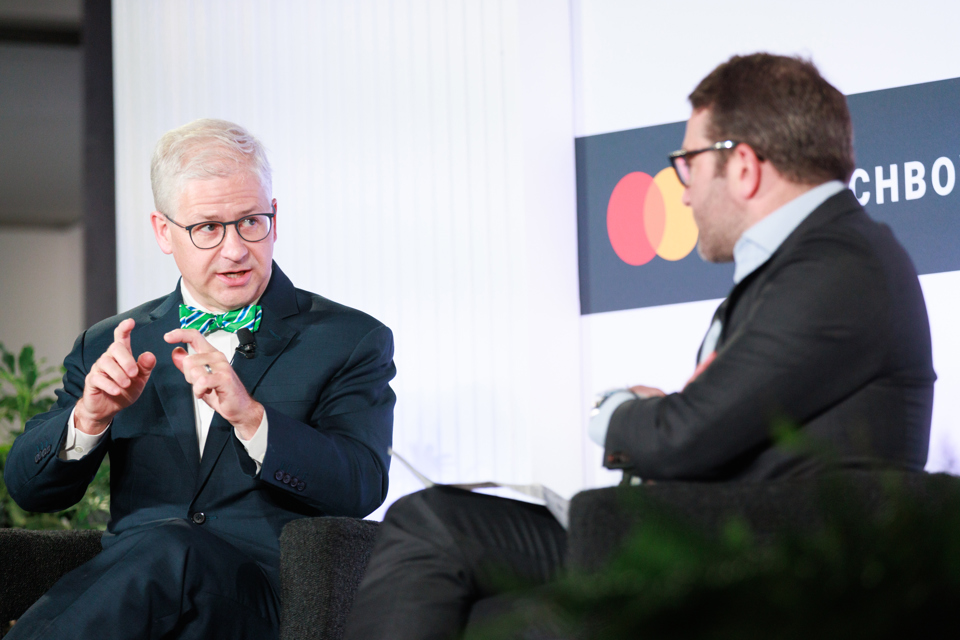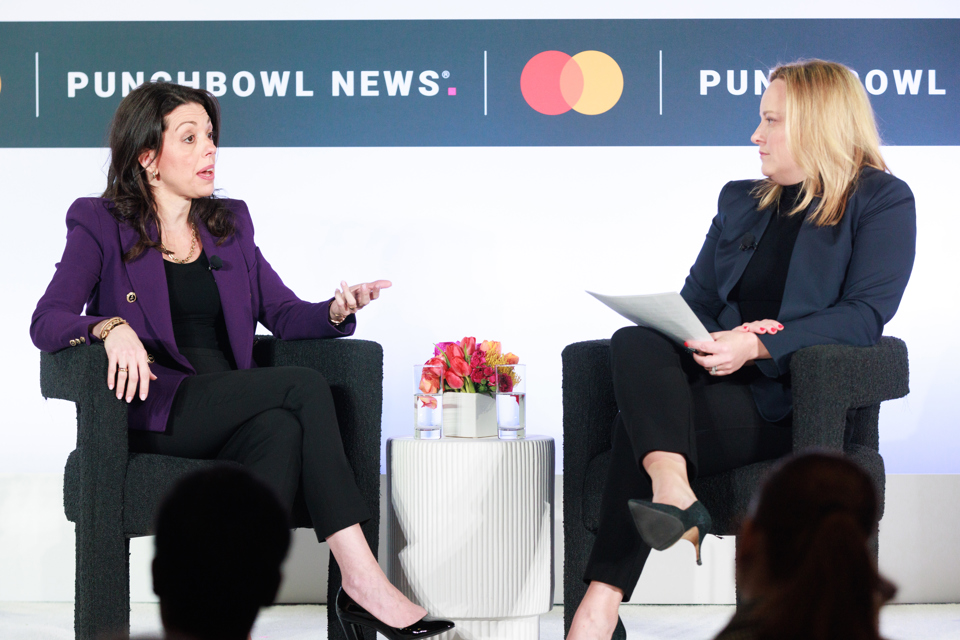How digital payments ignite small business success and financial inclusion
March 21, 2024 | By Ben Fox Rubin
U.S. Rep. Patrick McHenry, a Republican from North Carolina, said one of the first pieces of equipment his dad and a neighbor acquired to start their lawn-mowing business in the late 1970s was a used truck. It was purchased on credit with a Master Charge card, a precursor name for a Mastercard.
"That's entrepreneur’s spirit,” McHenry said. “And that's what credit cards can enable. That's like the first line of venture funding across America, the first piece of debt you can get.”
McHenry, who serves as chairman of the House Financial Services Committee, spoke Tuesday at a half-day summit in Washington, D.C., hosted by Punchbowl News and Mastercard. The event delved into the many benefits of digital payments, as well as ways to support innovation and inclusion in financial services.
The summit came at a time when some policymakers are proposing new measures that could significantly disrupt a payments ecosystem that is increasingly digital. Speakers at the event warned that the dynamic payments market — and the benefits it has provided to people like McHenry’s dad — would be harmed by proposed interchange legislation and regulations being considered in D.C.
"When you place artificial restrictions on interchange, what you're doing is hurting consumers — full stop,” said Linda Kirkpatrick, Mastercard’s president for its Americas region. “Why? Because you're removing the incentive to invest in innovation, to protect against fraud ... and to create a good consumer experience."
One of the biggest benefits of a flourishing digital payments industry is its ability to expand financial inclusion, Kirkpatrick said. That’s the concept of bringing more people into the formal financial system, thereby expanding their opportunities and boosting their prosperity.
Expanding financial inclusion enables more people to open financial accounts, start businesses, make payments and get paid, save and transfer money, and access loans.
To bring these benefits to more people, Mastercard is currently working toward its long-term goal of connecting 1 billion people and 50 million small businesses to the digital economy by 2025.
“Financial inclusion for us, it's not only the right thing to do for society,” Kirkpatrick said. “It's also good for our business.”
She added that Mastercard continually invests in cybersecurity, artificial intelligence and new payment technologies to empower and protect small businesses and people coming into the digital economy for the first time.
Her perspectives were reinforced during a panel discussion, which included small business owner Rahama Wright, Carl Holshouser, executive vice president of the trade association TechNet, and Carrie Hunt, the chief advocacy officer for America’s Credit Unions.
Wright, who runs the D.C.-based Shea Yeleen skincare company, said she couldn’t run her business without digital payments. With small businesses driving just about every local economy and employing millions of people across the U.S., supporting digital payments is an essential way to support small business, she added.
“That’s what is driving our ability to receive payments fast, quickly, as well as safely,” she said. “If we want to say that we’re supporting small businesses, help us make money faster, and that’s what digital payments allow us to do.”
Credit unions, which are nonprofits, need digital payments too, since their customers rely on them, Hunt noted. The U.S. needs innovation to stay ahead of fraudsters and to remain globally competitive, Holshouser said. Overregulation would restrict that. “Red tape never created any of the innovations that we're seeing,” he said.
McHenry said his work in Congress to support startup capital and technology firms is motivated by his father’s story. The best ways to harness that entrepreneurial spirit, he said, are by encouraging more partnerships between fintechs and banks, advancing digital payments and supporting digital asset and stablecoin legislation.
“We need to unlock that potential,” McHenry said. “And that will help banking, yes. It will help economic growth. But it also helps individuals better be able to take risks.”
He added that he’s kept the old Master Charge card his father used to help kick off his family’s business.
"Now my brother's taken it over. He employs a few hundred people,” he said. “So it's grown. It's grown quite a bit, but the first piece of outside debt or capital came from Mastercard.”
Banner photo: Rahama Wright, second from left, the entrepreneur who founded the skincare brand Shea Yeleen, with Carrie Hunt, left, the chief advocacy officer at America's Credit Unions, Carl Holshouser, executive vice president of TechNet, second from right, and Punchbowl News CEO Anna Palmer, right.

U.S. Rep. Patrick McHenry, R-N.C., left, speaks with Punchbowl News co-founder Jake Sherman at The Summit: The Digital Payments Economy Tuesday in Washington, D.C.

"When you place artificial restrictions on interchange, what you're doing is hurting consumers — full stop,” said Linda Kirkpatrick, left, president of Mastercard Americas, to Anna Palmer, CEO and co-founder of Punchbowl News.

J.C. Smith, who co-founded the clothing brand Bailiwick inspired by D.C.'s pride and energy, rings up a sale at the Makers Market.

Ceramist Yolanda Spears of the Washington, D.C., pottery studio Down2Earth Pottery took part in the Makers Market that was part of the summit Tuesday.

Rahama Wright, in green, is the founder of the skincare brand Shea Yeleen. She shared her insights at the summit and spoke with fellow D.C. entrepreneurs who took part in the Makers Market.